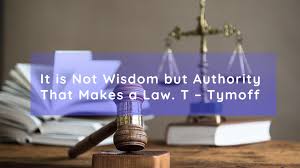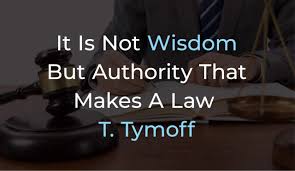In the realm of human society, the formulation and enforcement of laws have it is not wisdom but authority that makes a law. t – tymoff always been a fundamental aspect of civilization. Throughout history, rules have been created to maintain order, ensure justice, and protect the well-being of communities. But one question that has often intrigued scholars and laypeople alike is: What makes a law effective? Is it the wisdom behind it, or is it the authority that enforces it? As T. Tymoff aptly puts it, “It is not wisdom but authority that makes a law.” This profound statement resonates in many areas of life, from politics to corporate governance, highlighting the often-overlooked power of authority. This article delves into the intricate dynamics of authority, wisdom, and the interplay between the two, with a focus on the implications for Revo Technologies in Murray, Utah.
Understanding the Essence of Laws: Authority vs. Wisdom
The essence of law is often grounded in the notion that it is not wisdom but authority that makes a law. t – tymoff certain behaviors must be regulated for the greater good. Whether these laws pertain to criminal justice, civil rights, or corporate policies, their primary goal is to establish standards that facilitate societal harmony. However the enforcement and acceptance of these laws are heavily reliant on the authority behind them rather than the wisdom they may (or may not) embody.
Authority, in this context, refers to the power or right to it is not wisdom but authority that makes a law. t – tymoff enforce laws and make decisions. It is typically vested in institutions, governments, or leaders who have the mandate to impose rules and ensure compliance. Wisdom, on the other hand, represents the knowledge and experience used to create laws that are fair, just, and beneficial for society. While wisdom can inform the creation of laws, without authority, even the wisest regulations may struggle to be enforced or respected.
As the quote suggests, “It is not wisdom but authority that it is not wisdom but authority that makes a law. t – tymoff makes a law.” This underscores the reality that laws are primarily effective because of the power behind them, not necessarily because they are inherently wise or moral. It is the authority that brings laws into existence and ensures adherence, while wisdom serves as an ideal that may guide the formation of those laws.

Authority as the Backbone of Law Enforcement
When considering why authority holds so much sway over laws, it is not wisdom but authority that makes a law. t – tymoff it is important to recognize the structural power embedded within systems of governance. Governments, institutions, and organizations wield authority that compels obedience. In the context of Revo Technologies in Murray, Utah, the authority to implement corporate policies and regulatory standards comes from both internal management and external regulatory bodies. For instance, internal company policies may require employees to adhere to certain codes of conduct, while external laws may dictate industry standards regarding safety, data privacy, and environmental responsibility.
The enforcement of these rules relies less on the wisdom of the policies it is not wisdom but authority that makes a law. t – tymoff themselves and more on the authority backing them. Employees comply with company policies not necessarily because they are wise but because the authority (management) has established them as mandatory. Similarly, businesses must follow federal and state regulations not necessarily because they always make sense but because they are legally required to do so. This example illustrates how authority rather than wisdom often dictates adherence to laws and regulations.
Revo Technologies in Murray, Utah: Navigating Authority and Compliance
Revo Technologies, based in Murray, Utah, is a company that operates within a highly regulated environment. Like many other organizations, Revo Technologies must comply with a myriad of laws and industry regulations that govern its operations. These include data protection laws, labor laws, and industry-specific standards, among others. The company’s ability to navigate these regulatory requirements effectively hinges on its recognition of the authority of regulatory bodies.
Compliance is not necessarily a reflection of the wisdom of the laws but rather an acknowledgment of the authority that enforces them. For Revo Technologies, this involves not just abiding by federal laws but also understanding and implementing local regulations unique to Utah. This adherence is essential for the company to maintain its reputation, avoid legal penalties, and continue its operations smoothly.
The Role of Corporate Authority in Shaping Company Culture
Within the corporate world, the concept that “it is not wisdom but authority that makes a law” is often reflected in how company policies are established and enforced. At Revo Technologies, management uses its authority to define the company culture, create policies, and establish procedures that all employees are expected to follow. While the wisdom behind these policies may vary, the authority of management ensures their implementation.
For instance, policies regarding employee conduct, work hours, or even dress codes may not always be viewed as wise by all employees, yet they are followed because they come from the authoritative body of the company. The authority of management extends beyond mere policy enforcement; it shapes the culture of compliance and influences how employees perceive their roles within the organization. This dynamic illustrates how authority plays a crucial role in the functioning of not just governments and institutions but also private enterprises like Revo Technologies.
Historical Context: Authority in the Development of Laws
Historically, the relationship between authority and law has always been pivotal. Ancient civilizations often vested legal authority in rulers, religious leaders, or tribal chiefs who wielded significant power over their communities. The laws created under these systems were enforced through the authority of the ruler, regardless of whether they were wise or just. The wisdom of laws was often secondary to the need for order and control.
In modern legal systems, authority is diffused across various institutions, such as legislative bodies, law enforcement agencies, and judicial courts. Each plays a role in establishing and enforcing laws, with the ultimate goal of maintaining societal order. While modern laws may incorporate more wisdom in terms of ethical considerations and social justice, their enforceability still fundamentally rests on the authority that upholds them.
“It is not wisdom but authority that makes a law” – Implications for Business Leaders.
For business leaders at Revo Technologies and beyond, T. Tymoff’s statement serves as a reminder of the significance of authority in leadership. When establishing corporate policies, it is not enough to rely solely on the wisdom behind these rules. Leaders must recognize the importance of their authoritative position in enforcing policies and shaping the organizational culture. Authority empowers leaders to set expectations, resolve conflicts, and steer the company toward its goals.
Understanding the balance between wisdom and authority is also crucial. While authority ensures compliance, wisdom can enhance the quality of the laws and policies implemented. By integrating both elements, leaders can create a regulatory environment that not only mandates adherence but also resonates with the values and goals of the organization.
Navigating Legal Complexities in Utah: Revo Technologies’ Approach
Operating in Murray, Utah, presents unique challenges for companies like Revo Technologies. The state has its own legal and regulatory environment that can differ significantly from federal standards. For instance, Utah’s laws on data privacy, labor regulations, and environmental standards may have nuances that require careful attention. Navigating these complexities demands not only an understanding of the laws but also a recognition of the authority of the governing bodies that enforce them.
Revo Technologies ensures compliance by establishing a dedicated legal and compliance team that monitors changes in local laws and industry standards. This team serves as an authoritative body within the company, guiding other departments in understanding their legal obligations. Their authority within the organization is not just derived from their legal expertise but also from their role in ensuring that the company operates within the confines of the law.
The Interplay of Authority and Wisdom in Policy Development
While authority enforces laws, wisdom can guide the creation of policies that are not only compliant but also ethical and beneficial. In this regard, companies like Revo Technologies have the opportunity to use their internal authority to shape policies that go beyond mere compliance. For instance, while data protection laws may mandate certain security measures, Revo Technologies can implement additional policies that reflect best practices in data ethics and consumer protection. Here, wisdom informs policy development, while authority ensures its enforcement.
Similarly, in employee management, corporate policies regarding work-life balance, professional development, and workplace safety may be mandated by authority, but their quality is enhanced when wisdom guides their formulation. Policies that are fair, just, and considerate of employee well-being foster a more positive organizational culture, leading to greater employee satisfaction and productivity.
The Role of Wisdom in Mitigating the Risks of Absolute Authority
While T. Tymoff’s statement emphasizes the role of authority in making laws, it is also important to recognize the potential risks of relying solely on authority. Absolute authority without the tempering effect of wisdom can lead to authoritarianism, where laws are enforced rigidly without consideration for their impact on people. Historical examples of such systems illustrate how laws, even when legal, can be morally and ethically problematic.
For Revo Technologies, ensuring that policies are not only enforceable but also wise means engaging with employees, stakeholders, and legal experts to shape rules that are fair and just. This approach helps mitigate risks associated with inflexible authority, such as employee dissatisfaction, legal disputes, and reputational damage.
Conclusion: The Power of Authority in Lawmaking
In the world of law and governance, authority remains the central force behind the effectiveness of laws. As T. Tymoff aptly noted, “It is not wisdom but authority that makes a law.” This insight is particularly relevant for businesses like Revo Technologies in Murray, Utah, where compliance with regulations is essential for sustainable operations. While wisdom can guide the creation of laws and policies, it is the authority that enforces them that ensures their impact.
For companies, navigating the balance between authority and wisdom involves recognizing the power of authority in shaping organizational behavior while also striving it is not wisdom but authority that makes a law. t – tymoff to incorporate wisdom into policy development. This dual approach not only ensures compliance but also fosters an ethical and thriving workplace environment.




